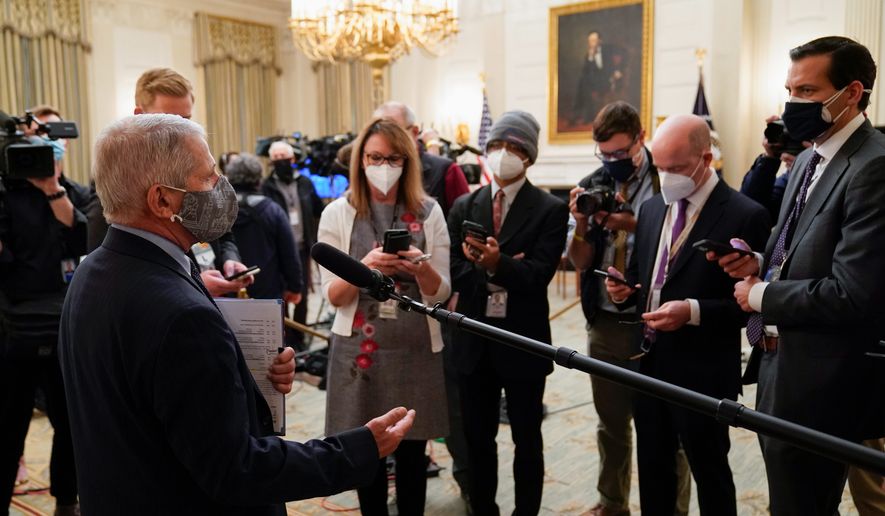Reported coronavirus cases have dropped in recent weeks, but the U.S. government fears fast-moving variants will spark new trouble, prompting President Biden to extend travel restrictions while a drugmaker tests a new version of its vaccine against a potent strain detected in South Africa.
A post-holiday surge sparked a daily average of 260,000 reported cases by Jan. 9, a number that has shrunk to 170,000 per day.
The U.S. has confirmed more than 25 million cases and many more were probably infected without realizing it, meaning a share of the country has built natural defenses to the disease while the vaccination campaign reaches 18 million Americans and counting.
Scientists hope to reach a tipping point this year, but the virus will cause a lot more damage.
“I do not think we are at the herd immunity threshold for the country yet, though some smaller geographical areas that were hit hard may be getting closer,” said Amesh Adalja, a senior scholar at the Johns Hopkins Center for Health Security. “It’s hard to know what to think of the dip in cases, because it may be an artifact of reporting and not a sustained drop. It is encouraging, however, and hopefully will be sustained, but I fear that it will not be.”
Reflecting that fear, Mr. Biden issued a proclamation Monday banning foreign travelers from South Africa as of Jan. 30 and extended restrictions on travelers from Brazil, Ireland, the United Kingdom and 26 countries in Europe known as the Schengen Area.
Former President Donald Trump had moved to ease those restrictions as of Jan. 26, while keeping a ban on travel from China and Iran.
“With the pandemic worsening and more contagious variants spreading, this isn’t the time to be lifting restrictions on international travel,” said White House press secretary Jen Psaki.
At the same time, California Gov. Gavin Newsom announced he was relaxing restrictions on outdoor dining and indoor salon appointments in wide swaths of the state, including the San Francisco Bay Area and Los Angeles, because of declining cases and a stabilizing situation in area hospitals.
The Democratic governor faced criticism over the shutdowns, especially after restaurants invested in outdoor seating, though some fear that easing will allow a resurgence in transmission.
Dr. Anthony Fauci, who heads infectious-disease research at the National Institutes of Health, said he thinks the national decline in cases is the downslope of a post-holiday spike and probably not the fruit of efforts to inoculate the American public.
Only 18.5 million Americans have received at least one dose of a COVID-19 vaccine. About 3.2 million people are fully vaccinated with both doses, according to a federal tracker.
“I don’t think the dynamics of what we’re seeing now with the plateauing is significantly influenced yet — it will be soon — by the vaccine. I just think it’s the natural course of plateauing,” Dr. Fauci told NBC’s “Today Show.” “We don’t want to get complacent and think things are going in the right direction we can pull back a bit. We do have circulating now in this country a variant from the U.K. that’s in over 20 states.”
He said the challenge is to make sure the variant doesn’t become dominant, since it spreads more easily and the U.K. released early data suggesting it might also be deadlier.
Dr. Fauci said existing vaccines produce a positive “cushion” against the strains but it’s important to be proactive.
“I don’t want people to think that the vaccines are not effective against them — they are,” Dr. Fauci said. “However, we really need to make sure that we begin — and we already have — to prepare, if it’s necessary, to upgrade the vaccines.”
Drugmaker Moderna said Monday its vaccine is less effective against the South African mutation than the U.K. variant, so it is exploring a revamped booster shot to improve protection.
The Massachusetts company tested its vaccine against the emerging strains using blood samples from eight trial participants and lab monkeys who had received doses. The vaccine produced a protective response, but scientists saw a six-fold reduction in its neutralizing power against the South African strain. The company is testing a version to fine-tune its attack.
“We are encouraged by these new data, which reinforce our confidence that the Moderna COVID-19 vaccine should be protective against these newly detected variants,” Moderna CEO Stphane Bancel said. “Out of an abundance of caution and leveraging the flexibility of our mRNA platform, we are advancing an emerging variant booster candidate against the variant first identified in the Republic of South Africa into the clinic to determine if it will be more effective to boost titers against this and potentially future variants.”
• Tom Howell Jr. can be reached at thowell@washingtontimes.com.




Please read our comment policy before commenting.